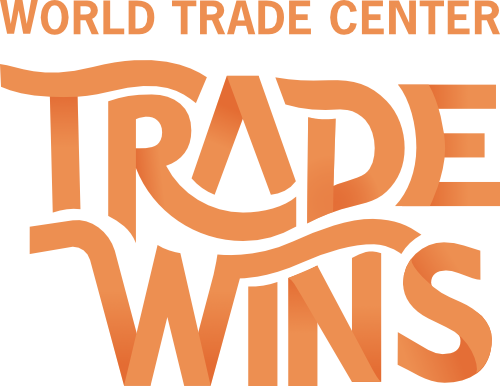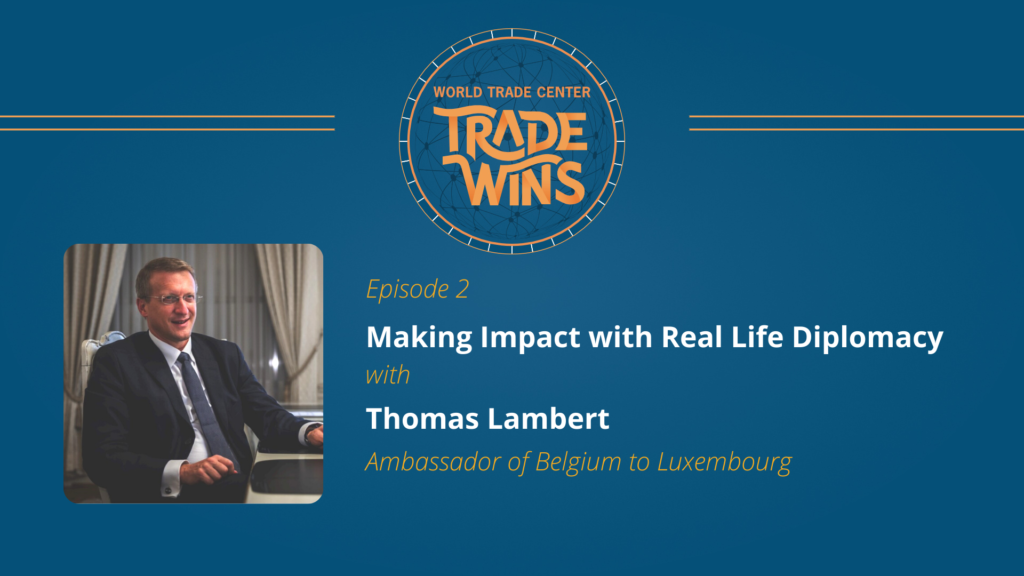Robin van Puyenbroeck 0:07
Welcome to WTCA Trade Wins. My guest today is Ambassador Thomas Lambert, currently serving as the ambassador of Belgium to Luxembourg. Previously, Thomas served as the diplomatic adviser to the Prime Minister and as director for the EU and Economic and Monetary Union at the Belgian Foreign Office. He also served in senior positions at the Belgian Embassy in Washington, DC and at the permanent mission of Belgium to the United Nations in New York. But above everything, Thomas is also an artist, a photographer, a very business-minded person, I would even say an entrepreneur at heart, who spices his opinions with a good dose of humor. So Thomas, welcome to the show.
Thomas Lambert 0:49
Welcome, Robin. Thank you very much. Hello, everyone.
Robin van Puyenbroeck 0:53
So Thomas, what would you like people to know about you?
Thomas Lambert 0:58
Well, I would say as little as possible. Now, that’s a joke. You know, about diplomats, maybe about diplomats in general and myself in particular. We work at a crossroads of many fields. Diplomats basically are interconnectors. And I, personally, I’ve always emphasized a decent convergence between politics and economics. And very often, these are two worlds that are far apart, a bit like two ships passing each other in the middle of the night. You see the lights, you don’t know who is on board of the ship, what it’s carrying, where it’s going, etc. So that’s the image I would like to use. But we’re basically interconnectors,
Robin van Puyenbroeck 1:42
That’s a very diplomatic answer.
Thomas Lambert 1:44
Well, it is reality. Believe it or not, we’re generalists at hearts. We’re never, almost never specialists in very specific fields. We know a bit of everything and not everything about a very vertical topic. That’s fate. It’s sometimes frustrating, but at the same time, it’s also very enriching.
Robin van Puyenbroeck 2:08
So you’re currently based in Luxembourg. How does a day at work look like in times of coronavirus, especially as a diplomat? How is diplomacy done in these times of corona? How do you go around town?
Thomas Lambert 2:21
Well, corona does affect our daily work, let me start with that. Now, Luxembourg is a very small country, but it’s a well run and efficient country. It’s a bit like the Western European equivalent of Switzerland. And, of course, restrictions are being applied here, but not much more than needed and in a very pragmatic way. Now, Luxembourg being a small country, you start hitting borders very, very often and very quickly. And then complications start in corona times. You start traveling and crossing borders. And what the audience needs to know is that before the pandemic started, and as a result of European integration, for decades, we’ve been erasing borders and in reality, they didn’t really exist anymore, or at least, not more than when you would travel from from New York to New Jersey. You wouldn’t, on the motorway, you wouldn’t even lift your foot from the pedal. And then it came back with a vengeance. Corona started hitting us and the three neighboring countries – Germany, France, Belgium – started applying restrictions. And that’s pretty heavy for a country that has quite a unique business model. Most inhabitants of Luxembourg are not working in the private sector, but there is a thriving private sector, which is manned, staffed by people from the neighboring countries who cross the borders every single day. And that got hit by corona. And, of course, following the evolution of the pandemic, rules kept changing all the time. And that means for an embassy like mine, you have to start applying crisis management and crisis communication. You have to start talking to very angry people or very frightened people or people who are very sober, very laid back. So that was a new dimension that got added to my mandate at the embassy here in Luxembourg. And then another big victim of corona is, you know, the classic core diplomatic network. We need to talk to people all the time, we need to bring people together, go to receptions as the cliche wants, but it’s also a reality and that was done away with from almost from day one. So that is a dimension of my work is totally gone. So the cliches about diplomatic work with receptions and champagne and maybe Ferrero Rochet pralines, that’s non existent for the moment. And so we talk to each other through video screens.
Robin van Puyenbroeck 5:13
I would hope you were serving Belgian chocolates instead of Ferrero Rocher.
Thomas Lambert 5:18
Well, unfortunately, I have to keep them to myself for the time being.
Robin van Puyenbroeck 5:23
Yeah. So Thomas, if I’m correct, you started also your new position in the middle of the pandemic, right? So you arrived and everything was shut down and closed. How was that because it’s a very different thing to start in a new position in the middle of the pandemic, starting to build a relationship from scratch from there versus being in a position, being at a post, and then work through that transition into the pandemic.
Thomas Lambert 5:46
True. And it started two weeks after I arrived. We got a little crisis at the office. We got a few people with COVID who tested positive. So I had to shut down the embassy basically, after two weeks being here in Luxembourg. And so what we did is to start applying safety and sanitary protocols, change our way of working, etc. And it worked. Ever since the end of October, there were no more infections at the embassy. But it’s pretty heavy. It’s a roller coaster experience. And then ever since I arrived, the only diplomatic activity with fellow ambassadors was only two weeks ago, one week ago. It is very special.
Robin van Puyenbroeck 6:31
Yeah, it’s interesting times. So you have a very distinguished career, of course, as a diplomat, but I also know you as a savvy business person. So let’s talk a bit about how, as a diplomat, you have engaged or you can engage with the business community?
Thomas Lambert 6:48
Well, let me first say that politics and business, those are very different fields of activity. They each have their own logic. And in my view, politics is more often than not the area of zero-sum games. And business and economics is very often the exact opposite, where you can work together and try to enlarge the cake, produce bigger pies for everyone. And so the very important challenge is to try to bring these two worlds together. It’s, for me, it’s a passion, but it’s also a challenge. What I personally like to do is to set up joint ventures, common projects that could be trade safe trade missions, introducing influential people from both fields to each other, and then absolutely and truly, enjoy the situation where you see there is a spark between these two dimensions. And, you know, as a diplomat, what I feel about my line of business is that it’s sometimes frustrating that you do not always see quick results. So on the rather rare occasions when that happens, say, with a contract signed or the start of a common project, I, from a human point of view and a professional point of view, that is a true delight. What I absolutely want people to understand is that we are information brokers. We like to open up closed loops, create bridges between say, politics, business, the military, science, culture. And that the fascinating thing is we get to synthesize and condense information on countries.
Robin van Puyenbroeck 8:34
Can you give us an example, Thomas, like a specific example. I know, when you were in the US, in New York, of course, it was the multilateral arena, but in Washington bilateral. Anything like a great example of some of the work that you did while you were here in the US and DC?
Thomas Lambert 8:50
Well, yes, of course. We worked very hard on organizing a very big trade mission. That was, I believe, the end of 2016 – trade mission from Belgium to Texas. And I think we brought in, we flew in 200 business people. Of course, that’s not something you organize in a few days. It took us three quarters of a year to set that up. And what worked very well is that we have an important thing in common with Texas. You have Houston as the biggest petrochemical hub in the world and you have Antwerp in Belgium which is number two in the world. And what we tried to do is to find synergies between the two of them. And very concretely, what works well is that we study to be the old Shale Gas Revolution in Texas and in the US. And we understood fairly quickly that one of the downstream products would be the production of plastic pellets, which would be as a byproduct or a downstream product would be shipped to Europe. And, of course, I wanted to capture most of that container traffic filled with pellets for Antwerp and for Belgian ports. And so in order to get there you organize several initiatives where you bring port managers, politicians, business people, shipping agents together. And as I mentioned, as a diplomat, you rarely get to enjoy the results because before they emerge you’ve already moved on to another posting. But I understand this mission I helped to organize went very well. And actually, the strong connections between the two ports and between Antwerp and Texas got a boost.
Robin van Puyenbroeck 10:48
Yeah, that’s a great example. And that sort of brings us to the topic of international trade. So having followed international trade and economic policy from upclose at the ministry, but also at the PMS office. So what do you make of the state of today’s global trade infrastructure? Is it adequate to serve the needs? Is it adequate to make it inclusive for everyone?
Thomas Lambert 11:11
Well, it probably never is. But maybe I should also point out that I also served four years at the WTO in Geneva and I mostly worked on the GATS, the Services Agreement and I chaired one of the negotiating bodies. I’m a firm believer in multilateralism and so is my country. And I like to think that the WTO is really the linchpin of global trade architecture. And I do agree, it certainly is under a fair amount of pressure. But at the same time, let’s not be too negative. One of the hidden gems of the WTO and even of the global trade architecture is what they call the TPRM, the Trade Policy Review Mechanism. It’s a mechanism that basically induces transparency on trade barriers and puts a spotlight on countries that try to reintroduce hidden or even overt protectionism. And then a peer review kicks in with all the member states. And many observers, and I agree with them, believe that TPRM proved to be extremely effective during the protracted financial crisis from 2008 on. And I believe it is still crucial for safeguarding global trade architecture and multilateralism. So yes, global trade architecture is under pressure, but multilateralism and commitments to multilateralism are still standing pretty strong despite all the tensions. And I’m under the impression that with the change of some administrations across the world, we’re seeing a slight reemergence of that commitment. Now, it’s always, and that’s the fate of multilateralism, it’s always a slow, technical, and very lengthy process.
Robin van Puyenbroeck 13:18
It’s a consensus model. And I agree. But I’m glad you brought up the WTO, because yesterday in conversation, someone said, “Well, let’s not look at the future of the WTO, but let’s look at the WTO of the future.” So do you think that the current refresh initiative in Geneva is going to be sufficient to achieve that?
Thomas Lambert 13:36
It’s hard to say and then everything depends on what the time span is. If you are anxious to see results in 2021, then forget about it. This is going to take some time. But at least the advantage of the WTO, and that may be in contrast with say, Bretton Woods Institutions, the classic Bretton Woods Institutions in that it’s a younger organization so it has more built in flexibility. I just mentioned that you have the recommitment of a few administrations, including the US administration, which is a foremost important player at the WTO. And that could give some hope and perspective for the near future. But it’s always an ongoing exercise. And the moment you create an institution, international trades, the day after the creation, it’s already starting to get slowly outdated. So it’s a continuum. You will never find a perfect balance on that.
Robin van Puyenbroeck 14:43
So true. It’s always striving for that perfection. But let’s talk a minute about the US/China relationship here. We’re more and more presenting really two competing value systems. And that relationship is at the core of the international trade infrastructure and it’s really going through very stormy waters. So how will both find a new balance here, a new equilibrium, because it is really needed to create stability around the world.
Thomas Lambert 15:08
I agree on that. But if I may add to that, that maybe could come as a surprise to some part of your audience, but never forget the EU as well. The EU with its internal market, it still provides the world’s largest consumer markets. It is a player in this regard as well. Now coming to the US and China. I personally believe very much, and I believe you’ve understood that already, in interdependence and not in isolationism. Trade and fair, and I stress fair economic relations, build bridges. And by building bridges, you reduce risk for conflicts and accidents. And that is why, as a diplomat, I deeply believe the business dialogue or the dialogue between countries at the level of business people is so important on both sides, US/China, but you can include Europe and many other places. And I do not necessarily agree with those who see China as the new foe, Soviet Union style. But, of course, I try not to be overly naive as well. But do bear in mind that China has committed to multilateralism and international cooperation. It’s difficult, but it’s there.
Robin van Puyenbroeck 16:37
Yeah, by no means I didn’t want to bring it as China’s a foe. It’s really more of that relationship between two parties, two economies, two political systems that consider themselves equal in this dialog here. And they both have, again, competing value systems. But especially China now considers themselves that they’re equal at the negotiation table. And this side of the Atlantic, the question is, where is the EU in all this? Will the EU have any political clout to have a third seat at the table, basically?
Thomas Lambert 17:08
Yeah, well, I believe I mentioned before the very different dimensions of zero-sum game and the nonzero-sum game. And it’s perfectly well illustrated by the US/China relationship and even the EU as well, to the extent that China is rising, there’s no doubt, end of discussion about that. It’s rising economically and that in itself should not be a problem. It even provides the basis for increasing the pie for having a win/win/win situation for everyone. But at the same time, China is not just rising economically, it also wants to rise politically. That’s a very different dimension to the extent that, I like to see that or I have to see that as more of a zero-sum game issue to the extent China rises and gets more influence, other states automatically or almost automatically would get to lose influence. And that is, you know, that is the difficult balancing act between the political side of the difficult relationship and economic side of the difficult relationship. Now the EU is in terms of business and economics is absolutely important to China and we have leverage there. Politically, we’re lagging behind in our integration. And, of course, it’s daily exercise. And China knows how difficult it is. And it’s not even rocket science to how difficult it is to bring 27 countries with very deep historic and political roots and their own differences, to bring them together and in order to have them to speak with one single voice politically speaking. In terms of trade policy, we have that. That’s clearly the commission. There’s still a lot of work that we have to do on the political side. So that causes a bit of a difficult relationship of the EU in that US/China balancing act. Of course, with the perspectives on increase for an improved transatlantic dialogue, that is positive news. And you can, of course, we have nuances and differences in our approach to China. But we’re seeing much more eye to eye in the transatlantic relationship than, let’s say, a year or two years ago. That is a fact.
Robin van Puyenbroeck 19:42
That will definitely improve going forward. And speaking of a balancing act, you worked with Prime Minister Wilmès. So what is it like to advise at the highest level of government, because you just mentioned it’s all against states, you have many seats on the table, it’s about compromise? So how is it like to work at that level?
Thomas Lambert 20:00
Well, it would be an understatement to call it a roller coaster experience. I started there two months before the pandemic, three or four months before the pandemic started. And in itself, in a complicated complex country like Belgium, it’s already very labor intensive. We started working on European topics, reaching out to Congo and Africa. There was Davos and then the pandemic hit. So having that on top of it, that was very very special, to say the least. You had all certainties vanish and it was literally crisis work from from dusk till dawn, very, very bizarre. I was amongst the few people in Brussels that were still allowed to go to the office through empty streets, no more lunches, grabbing coffees with colleagues, talking to the PM from a distance with a face mask and working through video screens all over the place. So it felt very dysfunctional and threatening.
Robin van Puyenbroeck 21:08
I can only imagine. So you’re obviously very passionate, Thomas, in what you do. So about all the things you do. So what drives you, really? And why do you love what you do? Where does it come from?
Thomas Lambert 21:21
Well, what drives me, I would say black coffee. But of course, that’s a joke.
Robin van Puyenbroeck 21:29
That’s not what you’re sipping on right now.
Thomas Lambert 21:31
No, I have a confession to make. I’m sipping on a Pomerol from Bordeaux.
Robin van Puyenbroeck 21:40
Very nice, very nice.
Thomas Lambert 21:41
You’re having lunch time, for me it’s the end of the day. So I’m allowed to have a sip or two from that.
Robin van Puyenbroeck 21:47
It’s always eight o’clock somewhere,
Thomas Lambert 21:50
Isn’t it? So what drives me in my job is the fantastic, the fascinating thing is I have basically no routine. Every day is different. Every year is different. I work with colleagues, diplomats, we all work for the same institution, but we all have very different careers. And I believe you cannot really be a good diplomat when you’re not at least a little bit fascinated by people. And that’s exactly what drives me. I work with people every day. I observe them, I learn from them, I love them, I sometimes hate them, and everything in between. But that is absolutely what drives me – working with people and having no routine in my job. And I know that for a fact, in three years, I’ll be in a different country, probably on another continent, and, beat me, but I have no clue where that will be. And it’s a cause for stress, but it also brings a lot of job satisfaction.
Robin van Puyenbroeck 23:01
Absolutely. Remember, there is this one show that we both really enjoy where we obsess about every move and every word and that is “Yes Minister” starring Sir Humphrey. So were these the so called, “good old days?”
Thomas Lambert 23:19
Well, Sir Humphrey Appleby, I call him my godfather. And I’ve haven’t done it yet, but I’m playing with the idea of framing a picture of him and putting him in my office. Maybe I would shock some people, which is okay. The good old days, you know, it’s a cartoon. It’s a black and white situation with the naive minister being manipulated by his mandarins. But in reality, there is something to it. There’s a certain degree of reality into it. At the same time, it’s a very interesting interplay. And I’ve always liked to work with politicians, like Prime Minister Wilmès, who were very curious in listening to diplomats with their insights, but at the same time, would be able to share the politician’s perspectives. And that can be very different than that. But once you get to adopt and to, or at least understand the logic and the reasoning of politicians, and then you hit the sweet spot, and then the cooperation and advising a prime minister can become very beneficial and very pleasant also in human terms.
Robin van Puyenbroeck 24:33
Very much so. So Thomas, you’re also, on a very different subject, a very passionate photographer. Tell us a bit more about that.
Thomas Lambert 24:41
Oh, well, for starters, I lack time to take pictures, but that’s not what you wanted to hear. But deep down, I like to believe that I have some, at least some creativity in my genes. But I lacked patience. I’m a very impatient person and so painting was never an option. But photography proved to be a quick focus match. Yeah, well, quick, but also it joins the drive of a diplomat. It helps you to observe the world around you. You’re trying to capture what you would otherwise not see and then you have to capture that, reduce it into three dimensions into two dimensions, and in my situation, you also try to twist it by removing colors. I’m a black and white photographer.
Robin van Puyenbroeck 25:36
I was going to ask color or black and white.
Thomas Lambert 25:39
Absolutely black and white. And by doing that and by reducing the dimensions into two dimensions, you know, with every shot you hope to reveal something else and at least trigger a wow or interest with other people. And, for me, it’s also a bonus to the extent that it’s, very often, it’s a good conversation starter.
Robin van Puyenbroeck 26:00
Depends on who or what you are taking pictures, of course.
Thomas Lambert 26:04
Of course.
Robin van Puyenbroeck 26:06
So, Thomas, in closing, and this is a very open question, but what can you share with us that you’ve never shared before?
Thomas Lambert 26:15
That’s a difficult one. Of course, nothing on the professional side. But let me give you a very anecdotal episode in my life. I was still a student, it’s anecdotal, but it has absolutely consequences on the way I work now. You know, as a kid, as a young student, I was at some point in time facing two important exams and they were each a few days apart. And so my plan was to start studying for one, have the exam, then I would still have two days for that for the next one. And that was the plan. But you know, I mixed up the two dates. I arrived with chemistry on my mind at the math exam. And when they handed me the copy of the questions, my world collapsed. I never told my parents. You’ve guessed that I failed both of these exams miserably. And I still have, literally, I still have nightmares about it. But the consequence in my life and in my professional life is that I’m pretty obsessed with managing my schedule and double, triple checking my agenda, trying never to be late, and having a good preparation of my files. And that’s a direct consequence of that stupid period in my student life.
Robin van Puyenbroeck 27:49
It sounds very familiar and I would say it also caused you to leave science behind forever as well.
Thomas Lambert 27:56
Yeah, that closed the door for good. And then I became a diplomat.
Robin van Puyenbroeck 28:01
And then you became a diplomat. No math or chemistry required.
Thomas Lambert 28:04
Just human chemistry. That’s enough for me.
Robin van Puyenbroeck 28:06
That’s great. So Thomas, thank you so much for sharing here with us today. I very much appreciate it. And I hope to see you soon, as soon as I make it out and back to Europe. Luxembourg will be first or second stop. So thank you so much, Thomas, for joining us today.
Thomas Lambert 28:19
Thank you very much. Take care.
Robin van Puyenbroeck 28:23
If you have any ideas for future episodes, know someone who would be an inspiring guest, or just want to stay apprised of our show, please make sure to connect with our team via email at podcast@wtca.org. Be sure to head over to podcast.wtca.org and subscribe to the show. We will see you soon.
